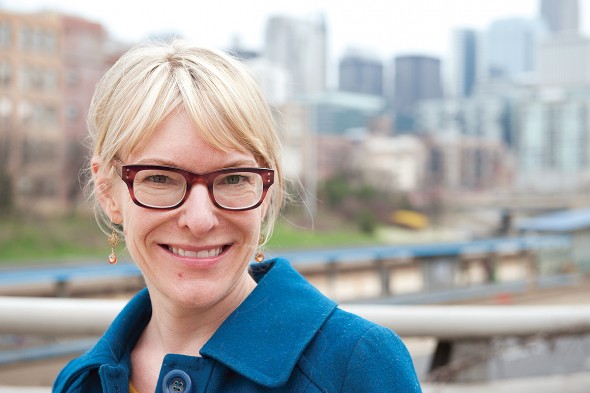Brenda Parker studies urban homesteaders

Brenda Parker is studying 50 households in the Chicago area who make ends meet by gardening, selling on eBay and bartering. Photo: Roberta Dupuis-Devlin/UIC Photo Services (click on image for larger file size)
Brenda Parker is curious about urban homesteaders and other self-provisioning households — folks who make ends meet by gardening, canning, selling items on eBay, swapping childcare, bartering or tackling do-it-yourself projects.
Last month she launched a study of these households, which sometimes include one person with a paid job.
Parker, assistant professor of urban planning and policy, will interview people in 40 households in the Chicago area.
“We want to understand the reasons households have chosen specific strategies, the resources and institutions they rely on, and the problems they face in providing for their households,” Parker said.
“What economic, family or neighborhood resources do households have to do the things they want to do?”
Some of those interviewed will be immigrants or formerly incarcerated mothers, who face special challenges.
“With an incarceration record or contingent legal status, they have less support and more barriers,” she noted.
The state of the economy affects everyone, and the households she is studying include whites, black and Latinos.
“Many have lost jobs or have insufficient income because of the recession,” she said.
They face difficult choices. For example, “One mother became an eBay seller because her daughter has a heart condition, and her employer wouldn’t let her leave at 4:30,” Parker said.
Participants in the study receive up to $40 in compensation. They can choose from gift cards to Walgreens, Target, Starbucks or Jewel.
“But I realize that many of these folks are into alternative economics — buying food at farmers’ markets and at the corner store — so I’m turning some to cash,” Parker said.
Parker has almost completed a book that came out of her doctoral research about urban neoliberalism in Milwaukee, to be published by University of Georgia Press. She defines neoliberalism as the extension of market concepts into all areas of life.
“Politics shift to embrace market sensibilities — free markets and efficiency, often at the expense of equity,” she said.
Parker did her research in Milwaukee when then-mayor John Norquist had adopted neoliberalism, promoting his ideas in the book The Wealth of Cities: Revitalizing the Centers of American Life, the title a reference to Adam Smith’s Wealth of Nations.
She grew up in Lansing, Mich., the third oldest among 11 children. “I did a lot of babysitting,” she said. “And I developed a tolerance for a wide range of personalities.”
She earned her bachelor’s degree at Michigan State University and her master’s and Ph.D. at the University of Wisconsin-Madison. She came to UIC in 2008. In Parker’s own household, “I’m a mother of three, whose husband travels a lot for work.”
She lives in Oak Park with her husband, Matthew Clifford, an education policy researcher for the American Institute for Research, and their children Lily, 8, Liam, 6, and Emmett, 4.
Parker recently did a triathlon — swimming, cycling and running — after turning 40.
“The last one was when I was 30,” she said. “If I do one every 10 years, that’s pretty good.” She also plays kickball.
An avid reader, she just finished Room, a novel by Emma Donoghue in which a mother and her child are entrapped in a room by deranged man.
“Another book by my bed is Runaway by Alice Munroe,” Parker said. “Her short stories are stunning.
“I’m also reading a nonfiction book by Franco Berardi called The Soul at Work: From Alienation to Autonomy. It’s about how modern intellectual work (alone at a computer, etc.) not only alienates and depresses us, but also subtly pushes us into all kinds of overwork and (un)free labor.
“Pretty interesting.”
